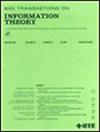局部模型中的量子差分隐私
IF 2.2
3区 计算机科学
Q3 COMPUTER SCIENCE, INFORMATION SYSTEMS
引用次数: 0
摘要
差分隐私为保护敏感数据提供了一个健壮的框架,同时保持了计算的实用性。从本质上讲,差分私有算法将多方的数据作为输入,并返回一个输出,该输出披露了关于任何单个方的最小信息。之前的研究已经引入了差分隐私的几个量子扩展,应用范围从私有经典数据的量子机器学习到量子阴影断层扫描。然而,量子差分隐私的本地模型——各方负责在本地层面上将自己的数据私有化——受到的关注有限。这项工作深入研究了局部差异私有量子测量。尽管任何测量都可以通过在结果中添加噪声来实现局部差分隐私,但我们证明了某些量子测量固有地满足特定类别输入状态的某种程度的局部差分隐私。这一发现有两个重要的含义:首先,将分析限制在经典的噪声注入机制可能导致量子数据的次优隐私效用权衡;其次,差分隐私理论可以用来进一步研究量子测量的能力。在这些见解的激励下,我们建立了局部差分隐私下量子相对熵的强数据处理不等式,并将这些结果应用于限制测量的量子态的非对称假设检验。此外,我们在局部模型中证明了量子统计查询和量子差分隐私之间的等价性,从而解决了**am等人(2021)提出的一个开放问题。最后,我们考虑了局部差分隐私下的量子多方计算任务,证明了该模型可以有效地学习宇称函数,而相应的经典任务需要指数级多的样本。本文章由计算机程序翻译,如有差异,请以英文原文为准。
Quantum Differential Privacy in the Local Model
Differential privacy provides a robust framework for protecting sensitive data, while maintaining its utility for computation. In essence, a differentially private algorithm takes as input the data of multiple parties, and returns an output disclosing minimal information about any individual party. Previous research has introduced several quantum extensions of differential privacy, with applications ranging from quantum machine learning on private classical data to quantum shadow tomography. However, the local model of quantum differential privacy – where each party is responsible for privatizing their own data at a local level – has received limited attention. This work delves into locally differentially private quantum measurements. Although any measurement can be made locally differentially private by adding noise to the outcome, we demonstrate that certain quantum measurements inherently satisfy some degree of local differential privacy for specific classes of input states. This finding has two significant implications: first, limiting the analysis to classical noise injection mechanisms may lead to suboptimal privacy-utility trade-offs for quantum data; second, the theory of differential privacy can be harnessed to further investigate the capabilities of quantum measurements. Motivated by these insights, we establish strong data processing inequalities for the quantum relative entropy under local differential privacy and apply these results to asymmetric hypothesis testing of quantum states with restricted measurements. Additionally, we prove an equivalence between quantum statistical queries and quantum differential privacy in the local model, thereby addressing an open question posed by Arunachalam et al. (2021). Finally, we consider the task of quantum multi-party computation under local differential privacy, demonstrating that parity functions can be efficiently learned in this model, whereas the corresponding classical task requires exponentially many samples.
求助全文
通过发布文献求助,成功后即可免费获取论文全文。
去求助
来源期刊

IEEE Transactions on Information Theory
工程技术-工程:电子与电气
CiteScore
5.70
自引率
20.00%
发文量
514
审稿时长
12 months
期刊介绍:
The IEEE Transactions on Information Theory is a journal that publishes theoretical and experimental papers concerned with the transmission, processing, and utilization of information. The boundaries of acceptable subject matter are intentionally not sharply delimited. Rather, it is hoped that as the focus of research activity changes, a flexible policy will permit this Transactions to follow suit. Current appropriate topics are best reflected by recent Tables of Contents; they are summarized in the titles of editorial areas that appear on the inside front cover.
 求助内容:
求助内容: 应助结果提醒方式:
应助结果提醒方式:


